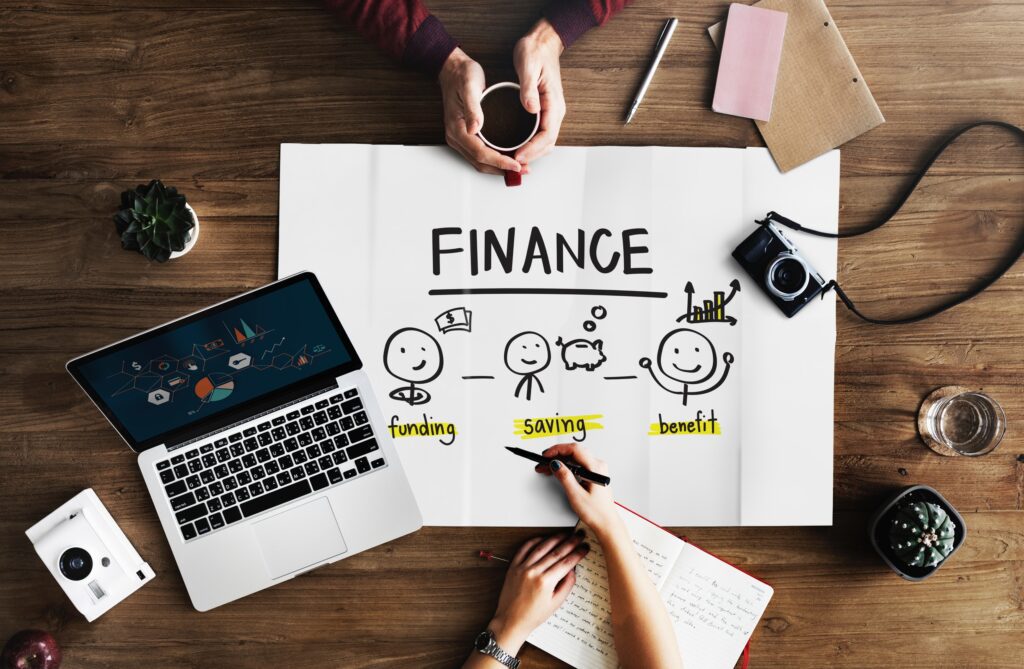If you are wondering how you can save more money or you want to know how to get a grip on your finances, we have three simple but powerful tips for your financial strategy.
With inflation as high as it has been in decades, you probably have the feeling that everything around you is changed drastically. The coronavirus crisis has not yet been overcome and there is still a war in Europe between Russia and Ukraine. Both have a negative impact on the economy and we think it is very important to take a closer look at your financial strategy.
Have you thought about how to keep track of your money on a daily, monthly and long-term basis in order to survive difficult times? The basis for your financial strategy is cash management.
Do your finances feel out of control?
We recommend you keep three accounts with different tasks. No matter how much you earn, whether you are an entrepreneur or an employee.
Let’s face it – many people spend what is in their bank account. But, there are many ways to prevent it: budget, save and invest your money. How?
1. Transaction account
2. Savings account (emergency account)
3. Investment account: Investing doesn’t have to be complicated! Whether you already have some knowledge or are just starting out, our finmarie financial app will help you to acquire financial knowledge step by step.
Now, think about what you actually want to do with your money. You probably need direct access to your day-to-day finances. But what about what’s left over each month? Do you want to save or maybe invest your money? The following three account types may be suitable for your goals.
Getting a grip on your finances is not as complicated as you think.
1. Transaction account
The basic account we all know. All your income should be paid into this account. Your variable expenses, which you budget, come out of this account. These are costs that are not the same every month – e.g. for food. Many people have more than one transaction account. This is usually not necessary.
Your expenses are much easier to track if you only have one transaction account. In times of online banking, management is particularly easy. The best and easiest way to do this is with your bank’s own app.
It’s also good that your transaction account “sounds an alarm” as soon as you overdraw it. Either you end up in the red, or the capacity of your account is completely exhausted. Do you have to regularly draw on your savings to replenish your account? Then you quickly realize that you are living beyond your means. Time to cut your spending.
With the money in your transaction account, you should be able to cover all your monthly expenses. It’s best to set a limit each month if you want to get your finances under control. Then see if you stay within that limit. If you don’t spend it all – very good. But keep in mind that you shouldn’t park your money in the account for more than three years, otherwise we’re talking about a “medium- to long-term investment”. But we’ll get there later.
So, quick recap: Keep only one transaction account for your cash management strategy. This makes it much easier for you to keep track of your finances, as you can see the balance directly. There are other accounts for other purposes.
2. Savings account
Let’s take care of your financial security. You may be thinking: How can I save money? Your savings account is your emergency account where you can only access it if you don’t have another choice. For example, let’s say that you lost your job and you don’t know how to pay your bills. It just feels sager to have a “back-up” for such emergencies. Right?
What’s the best way to save money? You can set a limit for your transaction account, e.g. that you have a maximum of 1000 euros in this account. Put everything that exceeds this limit into your savings account before the next cash inflow takes place.
Usually, you use a call money account at the same bank as your main account to make transactions easier. As John Schmidt from Forbes Advisor says, “it’s also a good idea to set up a standing order with a fixed monthly amount that is debited directly after your salary is received.”
How much do you need to have in a savings account with immediate access without getting into precarious situations? There are two factors that determine this:
– How reliable is your income? The less reliable, the more money you need as a “back-up” in your account.
– Do you have a family to take care of? If you are single, you don’t need that much money.
These are crucial points that determine how much money you should have in your savings account to take control of your finances. There is no such thing as the “right” amount of money in a savings account.
If you still want a rough rule of thumb, you can use 3 net monthly salaries as an employee and 6 net monthly incomes as a self-employed person as a guide. In addition, the following also applies here in particular: Do not leave your money in the account for more than three years, otherwise you will have a medium-term investment that is better off in the next account option.
It is a very personal decision that depends on your circumstances. Of course, it also depends on the level of comfort you are looking for. Once you have enough in your savings account, you can think about the next, very important point, your investment.
3. Investment account
The transaction account and the savings account are there to satisfy short-term needs and to secure you. An investment account is meant to provide you with wealth in the medium or long term.
So when your reserves are settled and you have money left over that you won’t need for the next few years, then you can start investing. Your investment needs time to grow.
Regular savings plans work well with investment accounts. As well as one-off payments, it’s best to add regular contributions to your investment account. These should come out of your transaction account in the form of a direct debit. This way you don’t have to keep track of payments and minimize the risk of forgetting them.
Ideally, we recommend that you invest 20% of your after-tax income. However, any amount is a start and will put you on the right track to getting your finances under control.
If you do need to dip into your savings account, be sure to replenish it until you reach your regular savings amount. It is always important to make sure that your savings account has the ideal balance before investing further in your investment account.
Saving is important in the short term. Investing is necessary in the long term.
Especially in uncertain times, we advise you to keep an overview of your finances. , take care of your transaction account first and then your savings account before you start investing money. Still, keep in mind that you don’t need to accumulate huge sums to start investing. It pays to start early. Whether you want to save for your pension or need money for other long-term goals.
OWN YOUR FINANCES!
Finally want to get a handle on your finances? Know where to start to be financially independent? Get your support now and arrange a FREE ESPRESSO COACHING! Your financial freedom with our experts!
Sources:





